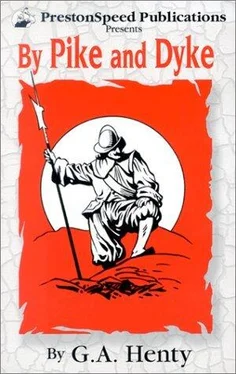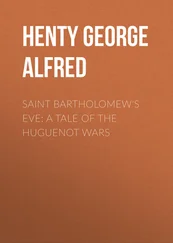G.A. Henty - By Pike and Dyke - A Tale of the Rise of the Dutch Republic
Здесь есть возможность читать онлайн «G.A. Henty - By Pike and Dyke - A Tale of the Rise of the Dutch Republic» весь текст электронной книги совершенно бесплатно (целиком полную версию без сокращений). В некоторых случаях можно слушать аудио, скачать через торрент в формате fb2 и присутствует краткое содержание. Жанр: Старинная литература, на английском языке. Описание произведения, (предисловие) а так же отзывы посетителей доступны на портале библиотеки ЛибКат.
- Название:By Pike and Dyke: A Tale of the Rise of the Dutch Republic
- Автор:
- Жанр:
- Год:неизвестен
- ISBN:нет данных
- Рейтинг книги:5 / 5. Голосов: 1
-
Избранное:Добавить в избранное
- Отзывы:
-
Ваша оценка:
- 100
- 1
- 2
- 3
- 4
- 5
By Pike and Dyke: A Tale of the Rise of the Dutch Republic: краткое содержание, описание и аннотация
Предлагаем к чтению аннотацию, описание, краткое содержание или предисловие (зависит от того, что написал сам автор книги «By Pike and Dyke: A Tale of the Rise of the Dutch Republic»). Если вы не нашли необходимую информацию о книге — напишите в комментариях, мы постараемся отыскать её.
By Pike and Dyke: A Tale of the Rise of the Dutch Republic — читать онлайн бесплатно полную книгу (весь текст) целиком
Ниже представлен текст книги, разбитый по страницам. Система сохранения места последней прочитанной страницы, позволяет с удобством читать онлайн бесплатно книгу «By Pike and Dyke: A Tale of the Rise of the Dutch Republic», без необходимости каждый раз заново искать на чём Вы остановились. Поставьте закладку, и сможете в любой момент перейти на страницу, на которой закончили чтение.
Интервал:
Закладка:
Guided by the light of the fireships they approached the dyke, and the Zeelanders sprang ashore and climbed up. They were met by several hundred Spanish troops, who, as soon as they saw the fireships burn out harmlessly, sallied out from their forts. The Zeelanders were beginning to give way when the Antwerp fleet came up on the other side, headed by Sainte Aldegonde. The new arrivals sprang from their boats and climbed the dyke. The Spaniards were driven off, and three thousand men occupied all the space between Fort George and the Palisade Fort.
With Sainte Aldegonde came all the English and Scotch troops in Antwerp under Balfour and Morgan, and many volunteers, among whom was Ned Martin. With Hohenlohe came Prince Maurice, William the Silent's son, a lad of eighteen. With wool sacks, sandbags, planks, and other materials the patriots now rapidly entrenched the position they had gained, while a large body of sappers and miners set to work with picks, mattocks, and shovels, tearing down the dyke. The Spaniards poured out from the forts; but Antwerpers, Dutchmen, Zeelanders, Scotchmen, and Englishmen met them bravely, and a tremendous conflict went on at each end of the narrow causeway.
Both parties fought with the greatest obstinacy, and for an hour there was no advantage on either side. At last the patriots were victorious, drove the Spaniards back into their two forts, and following up their success attacked the Palisade Fort. Its outworks were in their hands when a tremendous cheer was heard. The sappers and miners had done their work. Salt water poured through the broken dyke, and a Zeeland barge, freighted with provisions, floated triumphantly into the water beyond, now no longer an inland sea. Then when the triumph seemed achieved another fatal mistake was made by the patriots. Sainte Aldegonde and Hohenlohe, the two commanders of the enterprise, both leapt on board, anxious to be the first to carry the news of the victory to Antwerp, where they arrived in triumph, and set all the bells ringing and bonfires blazing.
For three hours the party on the dyke remained unmolested. Parma was at his camp four leagues away, and in ignorance of what had been done, and Mansfeldt could send no word across to him. The latter held a council of war, but it seemed that nothing could be done. Three thousand men were entrenched on the narrow dyke, covered by the guns of a hundred and sixty Zeeland ships. Some of the officers were in favour of waiting until nightfall; but at last the advice of a gallant officer, Camillo Capizucca, colonel of the Italian Legion, carried the day in favour of an immediate assault, and the Italians and Spaniards marched together from Fort Stabroek to the Palisade Fort, which was now in extremity.
They came in time, drove back the assailants, and were preparing to advance against them when a distant shout from the other end of the dyke told that Parma had arrived there. Mondragon moved from the Holy Cross to Fort George; and from that fort and from the Palisade the Spaniards advanced to the attack of the patriots' position. During the whole war no more desperate encounter took place than that upon the dyke, which was but six paces wide. The fight was long and furious. Three times the Spaniards were repulsed with tremendous loss; and while the patriot soldiers fought, their pioneers still carried on the destruction of the dyke.
A fourth assault was likewise repulsed, but the fifth was more successful. The Spaniards believed that they were led by a dead commander who had fallen some months before, and this superstitious belief inspired them with fresh courage. The entrenchment was carried, but its defenders fought as obstinately as before on the dyke behind it. Just at this moment the vessels of the Zeelanders began to draw off. Many had been sunk or disabled by the fire that the forts had maintained on them; and the rest found the water sinking fast, for the tide was now ebbing.
The patriots, believing that they were deserted by the fleet, were seized with a sudden panic; and, leaving the dyke, tried to wade or swim off to the ships. The Spaniards with shouts of victory pursued them. The English and Scotch were the last to abandon the position they had held for seven hours, and most of them were put to the sword. Two thousand in all were slain or drowned, the remainder succeeded in reaching the ships on one side or other of the dyke.
Ned Martin had fought to the last. He was standing side by side with Justinius of Nassau, and the two sprang together into a clump of high rushes, tore off their heavy armour and swam out to one of the Zeeland ships, which at once dropped down the river and reached the sea. Ned's mission was now at an end, and he at once returned to England.
The failure of the attempt upon the Kowenstyn dyke sealed the fate of Antwerp. It resisted until the middle of June; when finding hunger staring the city in the face, and having no hope whatever of relief, Sainte Aldegonde yielded to the clamour of the mob and opened negotiations.
These were continued for nearly two months. Parma was unaware that the town was reduced to such an extremity, and consented to give honourable terms. The treaty was signed on the 17th of August. There was to be a complete amnesty for the past. Royalist absentees were to be reinstated in their positions. Monasteries and churches to be restored to their former possessors. The inhabitants of the city were to practice the Catholic religion only, while those who refused to conform were allowed two years for the purpose of winding up their affairs. All prisoners, with the exception of Teligny, were to be released. Four hundred thousand florins were to be paid by the city as a fine, and the garrison were to leave the town with arms and baggage, and all honours of war.
The fall of Antwerp brought about with it the entire submission of Brabant and Flanders, and henceforth the war was continued solely by Zeeland, Holland, and Friesland.
The death of the Prince of Orange, and the fall of Antwerp, marked the conclusion of what may be called the first period of the struggle of the Netherlands for freedom. It was henceforth to enter upon another phase. England, which had long assisted Holland privately with money, and openly by the raising of volunteers for her service, was now about to enter the arena boldly and to play an important part in the struggle, which, after a long period of obstinate strife, was to end in the complete emancipation of the Netherlands from the yoke of Spain.
Sir Edward Martin married Gertrude Von Harp soon after his return to England. He retained the favour of Elizabeth to the day of her death, and there were few whose counsels had more influence with her. He long continued in the public service, although no longer compelled to do so as a means of livelihood; for as Holland and Zeeland freed themselves from the yoke of Spain, and made extraordinary strides in wealth and prosperity, the estates of the countess once more produced a splendid revenue, and this at her death came entirely to her daughter. A considerable portion of Sir Edward Martin's life, when not actually engaged upon public affairs, was spent upon the broad estates which had come to him from his wife.
END
Интервал:
Закладка:
Похожие книги на «By Pike and Dyke: A Tale of the Rise of the Dutch Republic»
Представляем Вашему вниманию похожие книги на «By Pike and Dyke: A Tale of the Rise of the Dutch Republic» списком для выбора. Мы отобрали схожую по названию и смыслу литературу в надежде предоставить читателям больше вариантов отыскать новые, интересные, ещё непрочитанные произведения.
Обсуждение, отзывы о книге «By Pike and Dyke: A Tale of the Rise of the Dutch Republic» и просто собственные мнения читателей. Оставьте ваши комментарии, напишите, что Вы думаете о произведении, его смысле или главных героях. Укажите что конкретно понравилось, а что нет, и почему Вы так считаете.












